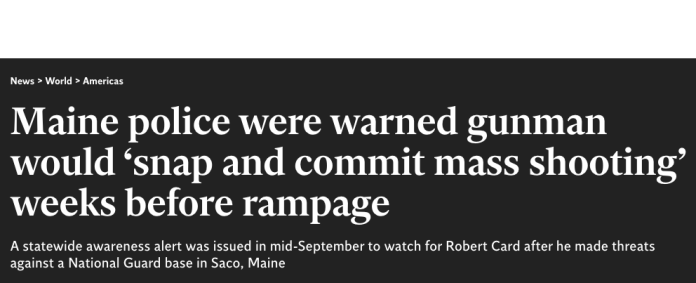
“Suspect was known to Maine Authorities.”
This headline and variations of it are common out of Maine, as more information about the shooter’s actions leading up to his attacks on the bowling alley and bar where he killed 18 people and wounded 13 others severely with gunfire, is torn apart and examined.
Card, the shooter, was a career length Army reservist of Staff NCO (E-7, Sergeant First Class) rank and some manner of shooting instructor. He made threats against a Reserve or National Guard station in September. The Center followed up with police who then attempted to find Card… for about 2 weeks. They stopped when they couldn’t find him.
This was the nightmare scenario that pro-gun advocates dread. One of “our own” (at least on paper to anti-2A types) going rogue and causing a mass causality event. But the more we learn the more this looks like yet another failure of the authorities, perhaps an unavoidable one, to do the things they continue to promise the public they can do. But they cannot, it is physically and digitally impossible to do.
Card then shot 31 people.
Background Check
Robert Card was, until that attack, a citizen “in good standing” and probably owned several firearms as an instructor. Even with threats leveled against the Saco, Maine military instillation, the specifics of which I do not know but prompted the notice from Maine Army National Guard, none of that changes the prior clearance to purchase or the otherwise professional background of the man.
A background check, no matter how universal you want to pretend it is, would not be able to prevent this. The checks were already done and passed.
He was also recently denied a silencer transfer at the point of sale. I do not know if he answered the 4473 or the Form 4 as prohibited, but one of them terminated the process. There is, however, no follow up on prohibited transfers that do not happen, there just isn’t. It is far too common an event and usually amounts to nothing. NICS false positive rates are absurdly high, especially for initial denials. Improper record keeping accounts for a dramatic percentage of the denials. Mistakes on paperwork account for another massive chunk. But in the end, Card did not get the silencer due to the gun shop employee actions.
In Card’s attempted silencer purchase it was his own answer on the form that denied him the transfer at the point of sale. Not a background check, no governmental authority checked for his mental health institutionalization, he volunteered that information. The background check system certainly “didn’t work” to stop him from the governmental end.
Side note: Anyone claiming that the silencer purchase would have made things tremendously worse is a moron, unworthy of giving an opinion on the subject. A “silenced” 5.56 rifle shot at short distance, indoors, is still uncomfortably loud and getting shot at at interior distances is hard to mistake.
Gun Free Zones
Both the bowling alley and the bar were gun free zones. That fact did nothing to prevent the attack. It was ignored as easily as a speed limit sign. It is just a written rule. People ignore written rules all the time. Unless the premises has an enforcement mechanism that rule is effectively a polite suggestion. Nothing more.
Red Flag Law
I’ve seen it written a few places that Maine doesn’t have a “Red Flag Law” and that this is what failed to prevent the tragedy. They have a colloquially titled “Yellow Flag Law” which seems to function exactly the same.
Let’s break this down.
Card was treated for something at a mental facility for a two week period during the summer. This seems to have been involuntary, but no confirmation. If it was involuntary he became a prohibited possessor federally at that time. This does not mean any action was initiated by the authorities to remove firearms, merely that he was now required to answer ‘yes’ like he did on his silencer application to the mental health question.
When he leveled the shooting threat against the Maine National Guard station, this behavior was acted upon by the police. That is how a red flag law works. Concerning behavior, reported behavior, court backed law enforcement action to attempt intervention.
But the police never made contact with Card, after two weeks the attempts were shelved and the case was closed as incomplete, no contact with suspect, and so forth, as much as the police had for information on their attempts.
That is the hard limit of an ERPO or any other preventative. They require the resources and interaction to enforce. It is in all other respects just the polite suggestion of society.
Will gun laws change?
There is certainly a current push for both “Universal Background Checks” which are the most likely effort to be put in place, and an assault weapon ban. But with an assault weapon ban on life support in California, the oldest version of the law in the nation, that avenue is most likely political grand standing and base appeasement, not the concerted efforts for a legislative push. The government is also rather hit and miss on its message of arming civilians as it pushes arms to Ukraine, which definitely armed civilians, and Israel, who was warned not to arm civilians with its delivered armaments.
Into that quagmire we are most likely to see much harrumphing and beating of chests, but little to endanger democrat reelection efforts needing to be ramped up next year in a dicey economy and with unpopularity and strife points across many spaces.



